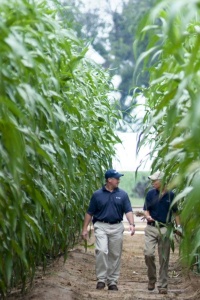World Economic Forum Report Outlines Future for Biorefining Industry in U.S. and Globally
WASHINGTON--(BUSINESS WIRE)--Today, during a keynote address at the BIO World Congress conference, Steen Riisgaard, CEO of Novozymes, a world leader in bioinnovation, unveiled a new report by the World Economic Forum (WEF) which concludes that converting biomass into fuels, energy, and chemicals has the potential to generate upwards of $230 billion to the global economy by 2020 – the majority of which will be in the U.S. Authored by professor Sir David King of Oxford University, the report also found that with expanded large-scale biorefinery production, dependence on fossil fuels could be dramatically reduced. The report, “The Future of Industrial Biorefineries,” was commissioned by World Economic Forum with participation from Novozymes, Braskem, Royal DSM N.V. and Dupont, and conducted by McKinsey & Company.
"We need an energy replacement that comes at oil's low price, but without its high environmental cost,” said Riisgaard. “Over time, cars, trucks, and even airplanes are going to run on sustainable low-carbon fuels derived from biomass. Plastics and chemicals will be made from plants rather than petroleum. As a result, biorefineries will infuse billions of dollars into the economy and create more than 800,000 new jobs."
Today, the biorefinery industry is in early development, however, according to the WEF report, governments and businesses across a range of sectors are recognizing the potential economic boom that exists in biorefining. For example, by the year 2020:
- The biofuels market alone is estimated to more than triple by 2020, with combined sales of $95 billion
- The demand for biomass to generate heat and power is expected to more than double
- Bio-based products will accumulate $15 billion in revenues
- Bio-based chemicals are expected to grow significantly and increase its share in overall chemicals production to an estimated nine percent of all chemicals
- Production of biomass within the farm gate is estimated at $90 billion - the largest business potential in the value chain
“In an oil-based society, the United States is at a competitive disadvantage,” Riisgaard concluded. “America has only two percent of the world’s oil reserves, while it uses more than 20 percent of the world’s oil. But in a bio-based society, America has a huge resource advantage. The U.S. has the world’s largest reserves of biomass available and more than 70 percent of the planned second generation biorefineries.”
Over the next few years, according to BIO, bio-based products have the potential to replace 10 percent of U.S. oil imports, significantly reduce CO2 emissions, create new revenue streams for U.S. farmers, and provide clean tech jobs in rural areas.
New Green Jobs – U.S. Poised to Lead
During his keynote address, Riisgaard highlighted the U.S. as the world leader in developing biorefineries. According to data provided by the Biotechnology Industry Organization (BIO), today’s developing biorefinery industry accounts for more than 40,000 jobs in the U.S. Commercialization of cellulosic biofuels is expected to create 800,000 new jobs (190,000 direct new green jobs, and 610,000 indirect new jobs) in the U.S. by 2022 alone. Achieving the biorefining industry’s full potential could create tens of thousands more new jobs within the next five years.
“While the U.S. has a head start, the race itself is only at the beginning,” said Riisgaard. “America’s competitive advantage cannot be taken for granted. If the U.S. wants to be a leader in developing these new clean energy technologies, it must build on the progress it’s already made. Congress and the Departments of Energy and Agriculture must ensure that the U.S. has a coherent and comprehensive strategy for the bio-based society and not just fragments of measures here and there.”
About Novozymes
Novozymes is the world leader in bioinnovation. Together with customers across a broad array of industries, we create tomorrow’s industrial biosolutions, improving our customers' business, and the use of our planet's resources. With over 700 products used in 130 countries, Novozymes’ bioinnovations improve industrial performance and safeguard the world’s resources by offering superior and sustainable solutions for tomorrow’s ever-changing marketplace. Novozymes’ natural solutions enhance and promote everything from removing trans-fats in food, to advancing biofuels to power the world tomorrow. Our never-ending exploration of nature’s potential is evidenced by over 6,000 patents, showing what is possible when nature and technology join forces. Our 5,000+ employees working in research, production and sales around the world are committed to shaping business today and our world tomorrow. Novozymes is quoted on NASDAQ OMX Copenhagen A/S. Read more at www.novozymes.com.
Photos/Multimedia Gallery Available: http://www.businesswire.com/cgi-bin/mmg.cgi?eid=6343804&lang=en
Contacts
Novozymes
Media relations:
U.S.
Paige Donnelly, 919-494-3209
Mobile: 919-218-4501
pagd@novozymes.com
or
Denmark
Johan Melchior, +45 3077 0690
jmel@novozymes.com
or
Analysts and investors:
U.S.
Thomas Bomhoff, 919-494-3279
Mobile: 919-218-4501
tsbn@novozymes.com

Ceres staff walk among sweet sorghum research plots in Texas. Sorghum is a highly efficient crop that produces large amounts of biomass. Sweet varieties can also be crushed and juiced for ethanol like sugarcane. (Source: Ceres, Inc.)

Switchgrass (Source: Ceres)

Wastepaper (Source: (c)iStockphoto.com/Novozymes)

Wood chips (Source: (c)iStockphoto.com/Novozymes)

Corn stover (Source: Novozymes)




